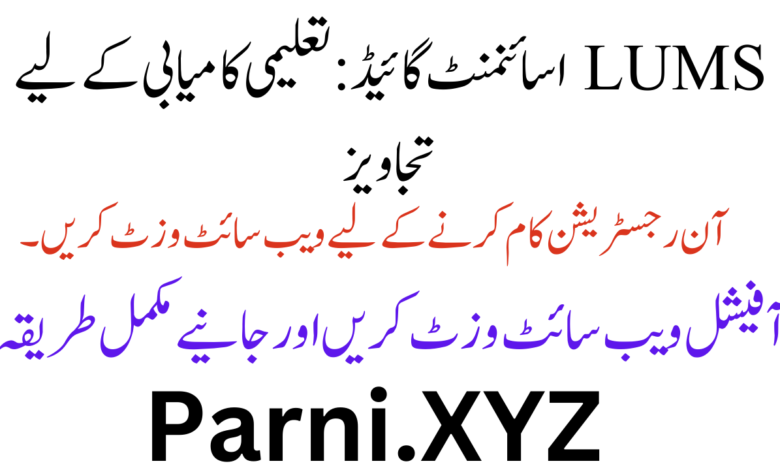LUMS Assignments Guide: Tips for Academic Success

Introduction to LUMS Assignments
Lahore University of Management Sciences (LUMS) is known for its rigorous academic standards, and LUMS assignments play a crucial role in evaluating students’ knowledge and skills. These assignments range from LUMS coursework to LUMS research papers, ensuring students develop effective research skills and critical thinking abilities.
Successfully completing LUMS university work requires strong study techniques, proper time management strategies for LUMS students, and adherence to academic integrity. In this guide, we’ll explore how to excel in LUMS academic tasks, maintain plagiarism-free writing, and submit high-quality assignments that meet university standards.
Understanding LUMS Assignment Requirements
To achieve top grades, students must understand LUMS assignment guidelines and follow the university’s expectations for LUMS coursework submission. Below are the key aspects to consider:
Key Guidelines for LUMS Coursework Submission
- Standard Formats for LUMS Research Papers and Reports
Assignments must be formatted according to university-specific styles like APA, MLA, or Harvard. Proper citation and referencing is essential for maintaining academic integrity. - Avoiding Plagiarism and Ensuring Originality
Using plagiarism-checking tools like Turnitin before submission is crucial to ensure plagiarism-free writing. - Adhering to University Deadlines
Managing deadlines efficiently with deadline management tools can prevent last-minute stress and improve assignment quality.
Types of Assignments at LUMS
- Essays and Reports – Require strong analytical skills and structured writing.
- Case Studies and Research Papers – Involve critical thinking and application of effective research skills.
- Thesis and Dissertation Submissions – Require extensive literature review and advanced research methodology.
- Group Projects and Presentations – Demand teamwork, organization, and presentation skills.
How to Complete LUMS Assignments on Time?
Time Management Strategies for LUMS Students
- Creating a Study Plan for Multiple LUMS Assignments
Prioritize tasks based on deadlines and complexity. Allocate time for research, writing, and proofreading. - Using Online Tools for Deadline Management
Tools like Trello, Notion, and Google Calendar help track deadlines for LUMS coursework assistance. - Breaking Large Assignments into Smaller Tasks
Divide your assignments into manageable sections to avoid last-minute panic.
Effective Research Skills for LUMS Coursework
- Gathering Credible Sources for LUMS Academic Tasks
Use LUMS library resources, Google Scholar, and academic databases to find reliable information. - Understanding Research Methodology
Learn the difference between qualitative and quantitative research to enhance the depth of your LUMS research papers. - Conducting a Literature Review
Summarize relevant studies and identify research gaps to support your arguments.
Writing and Formatting LUMS Assignments Properly
Essential Writing Tips for LUMS Homework and Reports
- Structuring Assignments Effectively
Begin with an introduction, develop your arguments in the body, and conclude with a strong summary. - Proofreading and Editing Before Submission
Eliminate errors using tools like Grammarly and ensure clarity with effective writing structure. - Maintaining Academic Integrity
Always cite sources correctly to avoid plagiarism and meet university standards.
Plagiarism-Free Writing and Academic Integrity
- Using Plagiarism-Checking Tools
Before submitting, check originality through Turnitin and other university-approved platforms. - Properly Paraphrasing and Citing Sources
Avoid copying text directly—rewrite ideas in your own words and use proper citations. - Understanding the Consequences of Academic Dishonesty
Plagiarism can lead to severe penalties, including assignment rejection or disciplinary action.
Where to Get Help with LUMS Assignments?
Best Online Resources for LUMS Coursework Assistance
- LUMS Library and Digital Archives
Access research papers, textbooks, and LUMS study materials online. - Academic Platforms Offering LUMS Study Materials
Websites like Google Scholar and ResearchGate provide valuable reference materials. - Tutoring and Peer Assistance Programs
Join study groups and seek help from senior students for LUMS university work.
How to Improve Your Academic Writing Skills for LUMS?
- Enrolling in Writing Workshops
Many universities offer writing workshops to enhance students’ skills in LUMS coursework writing. - Practicing Effective Research Skills
Frequent research and reading academic journals improve assignment quality. - Using AI-Free Tools to Refine Assignments
Manual proofreading ensures content remains original and high-quality.
Conclusion
Excelling in LUMS assignments requires strong study techniques, effective research skills, and strict adherence to academic integrity. By following university guidelines, managing time efficiently, and using credible LUMS study materials, students can produce high-quality coursework. Whether writing LUMS research papers, LUMS university reports, or preparing group projects, staying organized and committed is key to academic success.
FAQs
What is the standard format for LUMS research papers?
LUMS research papers follow APA, MLA, or Harvard formatting, with structured sections, proper citation and referencing, and clear research objectives.
How can I manage multiple LUMS assignments effectively?
Prioritize tasks, set deadlines using deadline management tools, and break assignments into smaller sections for better organization.
What are the best plagiarism-checking tools for LUMS assignments?
Turnitin, Grammarly, and Quetext are useful for ensuring plagiarism-free writing and maintaining academic integrity.
Where can I find LUMS study materials for assignment preparation?
LUMS provides digital libraries, academic research platforms, and peer groups to support students in completing assignments.
How do I write a literature review for my LUMS coursework?
A literature review involves analyzing previous research on your topic, identifying knowledge gaps, and ensuring sources are properly cited.



